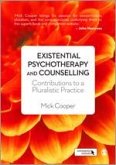- Gebundenes Buch
- Merkliste
- Auf die Merkliste
- Bewerten Bewerten
- Teilen
- Produkt teilen
- Produkterinnerung
- Produkterinnerung
Existential Therapy provides a comprehensive, accessible guide to a fascinating, exciting body of knowledge, and the therapeutic approach it informs
Andere Kunden interessierten sich auch für
![Re-Visioning Existential Therapy Re-Visioning Existential Therapy]() Re-Visioning Existential Therapy186,99 €
Re-Visioning Existential Therapy186,99 €![Nostalgia Nostalgia]() Clay RoutledgeNostalgia197,99 €
Clay RoutledgeNostalgia197,99 €![Humanistic Approaches to Multiculturalism and Diversity Humanistic Approaches to Multiculturalism and Diversity]() Humanistic Approaches to Multiculturalism and Diversity174,99 €
Humanistic Approaches to Multiculturalism and Diversity174,99 €![Existential Group Counselling and Psychotherapy Existential Group Counselling and Psychotherapy]() Karen Weixel-DixonExistential Group Counselling and Psychotherapy186,99 €
Karen Weixel-DixonExistential Group Counselling and Psychotherapy186,99 €![Working with Sexual Attraction in Psychotherapy Practice and Supervision Working with Sexual Attraction in Psychotherapy Practice and Supervision]() Working with Sexual Attraction in Psychotherapy Practice and Supervision186,99 €
Working with Sexual Attraction in Psychotherapy Practice and Supervision186,99 €![Existential Psychotherapy and Counselling Existential Psychotherapy and Counselling]() Mick CooperExistential Psychotherapy and Counselling169,99 €
Mick CooperExistential Psychotherapy and Counselling169,99 €![Existential Counselling and Psychotherapy Existential Counselling and Psychotherapy]() Darren LangdridgeExistential Counselling and Psychotherapy172,99 €
Darren LangdridgeExistential Counselling and Psychotherapy172,99 €-
-
-
Existential Therapy provides a comprehensive, accessible guide to a fascinating, exciting body of knowledge, and the therapeutic approach it informs
Hinweis: Dieser Artikel kann nur an eine deutsche Lieferadresse ausgeliefert werden.
Hinweis: Dieser Artikel kann nur an eine deutsche Lieferadresse ausgeliefert werden.
Produktdetails
- Produktdetails
- Verlag: Taylor & Francis
- Seitenzahl: 268
- Erscheinungstermin: 27. April 2015
- Englisch
- Abmessung: 201mm x 132mm x 20mm
- Gewicht: 363g
- ISBN-13: 9780415644419
- ISBN-10: 0415644410
- Artikelnr.: 41845709
- Herstellerkennzeichnung
- Libri GmbH
- Europaallee 1
- 36244 Bad Hersfeld
- gpsr@libri.de
- Verlag: Taylor & Francis
- Seitenzahl: 268
- Erscheinungstermin: 27. April 2015
- Englisch
- Abmessung: 201mm x 132mm x 20mm
- Gewicht: 363g
- ISBN-13: 9780415644419
- ISBN-10: 0415644410
- Artikelnr.: 41845709
- Herstellerkennzeichnung
- Libri GmbH
- Europaallee 1
- 36244 Bad Hersfeld
- gpsr@libri.de
Susan Iacovou is an existential psychotherapist working in online education for the University of Derby Online and in private practice in Cheshire. She manages a range of university programmes in psychology and psychotherapy and has developed award-winning, teaching materials for over 100 organizations worldwide. Susan Iacovou has been published widely and this is her fourth book. Karen Weixel-Dixon is a psychotherapist, supervisor, and accredited mediator in private practice, and a visiting lecturer at Regent's University London. She is co-director for Re-Solution partnership. She has been published widely.
Author Biographies. Introduction. Part I: Existentialism - Inception To
Present Day. What Is Existentialism? Historical Background, Philosophical
Foundations. The Basis Of An Existential Approach To Therapy. Existential
Therapy Here And Now. Part II: Theoretical Assumptions. Existence And
Essence And The Concept Of Self. Being-In-The-World.
Being-In-The-World-With-Others. The Universals Of Human Existence. The
Ontic And The Ontological. Existence Precedes Essence - Creating A Self Out
Of Nothing. The Contribution Of Phenomenology. The Phenomenological Method.
Intentionality. Noema And Noesis. Relatedness And The Formation Of The
Self. Intersubjectivity. Freedom, Choice, And Responsibility. Throwness,
Limitations And Finitude. The Centrality Of Anxiety, Loss And Suffering.
Death And Nothingness. Existential Guilt. Authenticity And Inauthenticity,
Bad Faith And Good Faith. Meaning And Absurdity In A Meaningless Cosmos.
Temporality And Orientation Towards The Future. Embodiment And The World.
An Existential Perspective On Sexuality. Consciousness And The Unconscious.
Absolute Truth, The Not-Knowing And The Un-Knowing. A Theory Of Emotions.
The Four Worlds: Physical, Personal, Social, Spiritual. Worlding,
Worldview, Values And Sedimented Beliefs. The I, You And We Focus.
Antipsychiatry And The Social Construction Of Madness. Language And
Existentialism. Part III: Existential Phenomenological Therapy In Practice
. The Foundational Elements Of An Existential Therapeutic Relationship. The
Therapy Environment. The Initial Encounter. The Role Of The Therapist. The
Role Of The Client. Contracting And Boundary Setting. Assessment From An
Existential Perspective. The Aim Of Existential Psychotherapy. The
Centrality Of The Therapeutic Encounter. Key Therapeutic Tasks. Exploring
The Four Worlds. Mapping The Client's Worldview. Tuning In To Emotions.
Presence, Immediacy, And Moving To An I-Thou. Making The Implicit,
Explicit. Choosing And Changing. Creating/Finding A Project, Meaning And
Values. Confronting Freedom And Limitations. Developing An Appreciation For
The Authentic Self-In-Relation. Dealing With Breakdowns And Crises. Being
And Non-Being And The Courage To Be. Ending Therapy. Working Existentially
With What The Client Brings. Exploring Isolation And Loneliness. Working
With Unhappiness And Dis-Ease. The Lessons Of Guilt And Shame.
Understanding And Managing Dilemmas And Conflict. Working With Paradox,
Polarities, And Existential Tensions. Coping With Death, Loss, And
Suffering, And The Potential For Growth. Supporting The Client Living With
Serious Or Terminal Illness. Using Dreams And Imagination To Elucidate The
Client's Way Of Being-In-The-World. Dealing With Voices And Hallucinations
In Existential Therapy. Working With Anxiety, Existential, Neurotic And
Normal. Working With Addictions. Working With Depression. An Existential
Understanding Of Trauma, And How To Engage With It. An Existential
Perspective On Self-Harm. Using Philosophy To Inform Work With Suicide And
Suicidal Ideation. Key Competencies Of The Existential Therapist.
Developing A Personal Existential Therapy. Adopting An Existential
Attitude. Descriptive Interpretation Rather Than Explanation. Being With
And Being For The Client. Taking The Role Of The Other. Challenging With
Curiosity And Directness. Assuming A Dialogical Attitude. Normalising
Verses Diagnosing - An Existential Perspective. Working Existentially In A
Time-Limited Way. Using Myth, Metaphor And Philosophy.Exploring Sexuality,
Gender And Identity In Existential Terms. Exploring Sexuality, Gender And
Identity In Existential Terms. Leaping Ahead Versus Leaping In. Wisdom And
The Passionate Life. Working Existentially With Groups.Existential
Relationship Therapy. Part IV: Ethics And Existential Therapy. Choosing Who
To Work With. Confidentiality, Note Taking And Relations With Outside
Agencies. The Issue Of Power In Existential Therapy. Self-Disclosure In An
Existential Framework. Existential Supervision Skills. Life After
Existential Therapy. Part 5: Bringing It All Together. Critical
Perspectives On Existential Psychotherapy. A Critique Of The Dominant
Scientific Paradigm In Psychotherapy. Research And The Effectiveness Of
Existential Therapy. Shared Origins, Multiple Directions. The British
School Of Existential Psychotherapy. The European School Of Existential
Therapy. The North American School Of Existential Therapy. Existentialism
And Other Therapeutic Orientations. The Case For Existentialism As An
Over-Arching Framework.
Present Day. What Is Existentialism? Historical Background, Philosophical
Foundations. The Basis Of An Existential Approach To Therapy. Existential
Therapy Here And Now. Part II: Theoretical Assumptions. Existence And
Essence And The Concept Of Self. Being-In-The-World.
Being-In-The-World-With-Others. The Universals Of Human Existence. The
Ontic And The Ontological. Existence Precedes Essence - Creating A Self Out
Of Nothing. The Contribution Of Phenomenology. The Phenomenological Method.
Intentionality. Noema And Noesis. Relatedness And The Formation Of The
Self. Intersubjectivity. Freedom, Choice, And Responsibility. Throwness,
Limitations And Finitude. The Centrality Of Anxiety, Loss And Suffering.
Death And Nothingness. Existential Guilt. Authenticity And Inauthenticity,
Bad Faith And Good Faith. Meaning And Absurdity In A Meaningless Cosmos.
Temporality And Orientation Towards The Future. Embodiment And The World.
An Existential Perspective On Sexuality. Consciousness And The Unconscious.
Absolute Truth, The Not-Knowing And The Un-Knowing. A Theory Of Emotions.
The Four Worlds: Physical, Personal, Social, Spiritual. Worlding,
Worldview, Values And Sedimented Beliefs. The I, You And We Focus.
Antipsychiatry And The Social Construction Of Madness. Language And
Existentialism. Part III: Existential Phenomenological Therapy In Practice
. The Foundational Elements Of An Existential Therapeutic Relationship. The
Therapy Environment. The Initial Encounter. The Role Of The Therapist. The
Role Of The Client. Contracting And Boundary Setting. Assessment From An
Existential Perspective. The Aim Of Existential Psychotherapy. The
Centrality Of The Therapeutic Encounter. Key Therapeutic Tasks. Exploring
The Four Worlds. Mapping The Client's Worldview. Tuning In To Emotions.
Presence, Immediacy, And Moving To An I-Thou. Making The Implicit,
Explicit. Choosing And Changing. Creating/Finding A Project, Meaning And
Values. Confronting Freedom And Limitations. Developing An Appreciation For
The Authentic Self-In-Relation. Dealing With Breakdowns And Crises. Being
And Non-Being And The Courage To Be. Ending Therapy. Working Existentially
With What The Client Brings. Exploring Isolation And Loneliness. Working
With Unhappiness And Dis-Ease. The Lessons Of Guilt And Shame.
Understanding And Managing Dilemmas And Conflict. Working With Paradox,
Polarities, And Existential Tensions. Coping With Death, Loss, And
Suffering, And The Potential For Growth. Supporting The Client Living With
Serious Or Terminal Illness. Using Dreams And Imagination To Elucidate The
Client's Way Of Being-In-The-World. Dealing With Voices And Hallucinations
In Existential Therapy. Working With Anxiety, Existential, Neurotic And
Normal. Working With Addictions. Working With Depression. An Existential
Understanding Of Trauma, And How To Engage With It. An Existential
Perspective On Self-Harm. Using Philosophy To Inform Work With Suicide And
Suicidal Ideation. Key Competencies Of The Existential Therapist.
Developing A Personal Existential Therapy. Adopting An Existential
Attitude. Descriptive Interpretation Rather Than Explanation. Being With
And Being For The Client. Taking The Role Of The Other. Challenging With
Curiosity And Directness. Assuming A Dialogical Attitude. Normalising
Verses Diagnosing - An Existential Perspective. Working Existentially In A
Time-Limited Way. Using Myth, Metaphor And Philosophy.Exploring Sexuality,
Gender And Identity In Existential Terms. Exploring Sexuality, Gender And
Identity In Existential Terms. Leaping Ahead Versus Leaping In. Wisdom And
The Passionate Life. Working Existentially With Groups.Existential
Relationship Therapy. Part IV: Ethics And Existential Therapy. Choosing Who
To Work With. Confidentiality, Note Taking And Relations With Outside
Agencies. The Issue Of Power In Existential Therapy. Self-Disclosure In An
Existential Framework. Existential Supervision Skills. Life After
Existential Therapy. Part 5: Bringing It All Together. Critical
Perspectives On Existential Psychotherapy. A Critique Of The Dominant
Scientific Paradigm In Psychotherapy. Research And The Effectiveness Of
Existential Therapy. Shared Origins, Multiple Directions. The British
School Of Existential Psychotherapy. The European School Of Existential
Therapy. The North American School Of Existential Therapy. Existentialism
And Other Therapeutic Orientations. The Case For Existentialism As An
Over-Arching Framework.
Author Biographies. Introduction. Part I: Existentialism - Inception To
Present Day. What Is Existentialism? Historical Background, Philosophical
Foundations. The Basis Of An Existential Approach To Therapy. Existential
Therapy Here And Now. Part II: Theoretical Assumptions. Existence And
Essence And The Concept Of Self. Being-In-The-World.
Being-In-The-World-With-Others. The Universals Of Human Existence. The
Ontic And The Ontological. Existence Precedes Essence - Creating A Self Out
Of Nothing. The Contribution Of Phenomenology. The Phenomenological Method.
Intentionality. Noema And Noesis. Relatedness And The Formation Of The
Self. Intersubjectivity. Freedom, Choice, And Responsibility. Throwness,
Limitations And Finitude. The Centrality Of Anxiety, Loss And Suffering.
Death And Nothingness. Existential Guilt. Authenticity And Inauthenticity,
Bad Faith And Good Faith. Meaning And Absurdity In A Meaningless Cosmos.
Temporality And Orientation Towards The Future. Embodiment And The World.
An Existential Perspective On Sexuality. Consciousness And The Unconscious.
Absolute Truth, The Not-Knowing And The Un-Knowing. A Theory Of Emotions.
The Four Worlds: Physical, Personal, Social, Spiritual. Worlding,
Worldview, Values And Sedimented Beliefs. The I, You And We Focus.
Antipsychiatry And The Social Construction Of Madness. Language And
Existentialism. Part III: Existential Phenomenological Therapy In Practice
. The Foundational Elements Of An Existential Therapeutic Relationship. The
Therapy Environment. The Initial Encounter. The Role Of The Therapist. The
Role Of The Client. Contracting And Boundary Setting. Assessment From An
Existential Perspective. The Aim Of Existential Psychotherapy. The
Centrality Of The Therapeutic Encounter. Key Therapeutic Tasks. Exploring
The Four Worlds. Mapping The Client's Worldview. Tuning In To Emotions.
Presence, Immediacy, And Moving To An I-Thou. Making The Implicit,
Explicit. Choosing And Changing. Creating/Finding A Project, Meaning And
Values. Confronting Freedom And Limitations. Developing An Appreciation For
The Authentic Self-In-Relation. Dealing With Breakdowns And Crises. Being
And Non-Being And The Courage To Be. Ending Therapy. Working Existentially
With What The Client Brings. Exploring Isolation And Loneliness. Working
With Unhappiness And Dis-Ease. The Lessons Of Guilt And Shame.
Understanding And Managing Dilemmas And Conflict. Working With Paradox,
Polarities, And Existential Tensions. Coping With Death, Loss, And
Suffering, And The Potential For Growth. Supporting The Client Living With
Serious Or Terminal Illness. Using Dreams And Imagination To Elucidate The
Client's Way Of Being-In-The-World. Dealing With Voices And Hallucinations
In Existential Therapy. Working With Anxiety, Existential, Neurotic And
Normal. Working With Addictions. Working With Depression. An Existential
Understanding Of Trauma, And How To Engage With It. An Existential
Perspective On Self-Harm. Using Philosophy To Inform Work With Suicide And
Suicidal Ideation. Key Competencies Of The Existential Therapist.
Developing A Personal Existential Therapy. Adopting An Existential
Attitude. Descriptive Interpretation Rather Than Explanation. Being With
And Being For The Client. Taking The Role Of The Other. Challenging With
Curiosity And Directness. Assuming A Dialogical Attitude. Normalising
Verses Diagnosing - An Existential Perspective. Working Existentially In A
Time-Limited Way. Using Myth, Metaphor And Philosophy.Exploring Sexuality,
Gender And Identity In Existential Terms. Exploring Sexuality, Gender And
Identity In Existential Terms. Leaping Ahead Versus Leaping In. Wisdom And
The Passionate Life. Working Existentially With Groups.Existential
Relationship Therapy. Part IV: Ethics And Existential Therapy. Choosing Who
To Work With. Confidentiality, Note Taking And Relations With Outside
Agencies. The Issue Of Power In Existential Therapy. Self-Disclosure In An
Existential Framework. Existential Supervision Skills. Life After
Existential Therapy. Part 5: Bringing It All Together. Critical
Perspectives On Existential Psychotherapy. A Critique Of The Dominant
Scientific Paradigm In Psychotherapy. Research And The Effectiveness Of
Existential Therapy. Shared Origins, Multiple Directions. The British
School Of Existential Psychotherapy. The European School Of Existential
Therapy. The North American School Of Existential Therapy. Existentialism
And Other Therapeutic Orientations. The Case For Existentialism As An
Over-Arching Framework.
Present Day. What Is Existentialism? Historical Background, Philosophical
Foundations. The Basis Of An Existential Approach To Therapy. Existential
Therapy Here And Now. Part II: Theoretical Assumptions. Existence And
Essence And The Concept Of Self. Being-In-The-World.
Being-In-The-World-With-Others. The Universals Of Human Existence. The
Ontic And The Ontological. Existence Precedes Essence - Creating A Self Out
Of Nothing. The Contribution Of Phenomenology. The Phenomenological Method.
Intentionality. Noema And Noesis. Relatedness And The Formation Of The
Self. Intersubjectivity. Freedom, Choice, And Responsibility. Throwness,
Limitations And Finitude. The Centrality Of Anxiety, Loss And Suffering.
Death And Nothingness. Existential Guilt. Authenticity And Inauthenticity,
Bad Faith And Good Faith. Meaning And Absurdity In A Meaningless Cosmos.
Temporality And Orientation Towards The Future. Embodiment And The World.
An Existential Perspective On Sexuality. Consciousness And The Unconscious.
Absolute Truth, The Not-Knowing And The Un-Knowing. A Theory Of Emotions.
The Four Worlds: Physical, Personal, Social, Spiritual. Worlding,
Worldview, Values And Sedimented Beliefs. The I, You And We Focus.
Antipsychiatry And The Social Construction Of Madness. Language And
Existentialism. Part III: Existential Phenomenological Therapy In Practice
. The Foundational Elements Of An Existential Therapeutic Relationship. The
Therapy Environment. The Initial Encounter. The Role Of The Therapist. The
Role Of The Client. Contracting And Boundary Setting. Assessment From An
Existential Perspective. The Aim Of Existential Psychotherapy. The
Centrality Of The Therapeutic Encounter. Key Therapeutic Tasks. Exploring
The Four Worlds. Mapping The Client's Worldview. Tuning In To Emotions.
Presence, Immediacy, And Moving To An I-Thou. Making The Implicit,
Explicit. Choosing And Changing. Creating/Finding A Project, Meaning And
Values. Confronting Freedom And Limitations. Developing An Appreciation For
The Authentic Self-In-Relation. Dealing With Breakdowns And Crises. Being
And Non-Being And The Courage To Be. Ending Therapy. Working Existentially
With What The Client Brings. Exploring Isolation And Loneliness. Working
With Unhappiness And Dis-Ease. The Lessons Of Guilt And Shame.
Understanding And Managing Dilemmas And Conflict. Working With Paradox,
Polarities, And Existential Tensions. Coping With Death, Loss, And
Suffering, And The Potential For Growth. Supporting The Client Living With
Serious Or Terminal Illness. Using Dreams And Imagination To Elucidate The
Client's Way Of Being-In-The-World. Dealing With Voices And Hallucinations
In Existential Therapy. Working With Anxiety, Existential, Neurotic And
Normal. Working With Addictions. Working With Depression. An Existential
Understanding Of Trauma, And How To Engage With It. An Existential
Perspective On Self-Harm. Using Philosophy To Inform Work With Suicide And
Suicidal Ideation. Key Competencies Of The Existential Therapist.
Developing A Personal Existential Therapy. Adopting An Existential
Attitude. Descriptive Interpretation Rather Than Explanation. Being With
And Being For The Client. Taking The Role Of The Other. Challenging With
Curiosity And Directness. Assuming A Dialogical Attitude. Normalising
Verses Diagnosing - An Existential Perspective. Working Existentially In A
Time-Limited Way. Using Myth, Metaphor And Philosophy.Exploring Sexuality,
Gender And Identity In Existential Terms. Exploring Sexuality, Gender And
Identity In Existential Terms. Leaping Ahead Versus Leaping In. Wisdom And
The Passionate Life. Working Existentially With Groups.Existential
Relationship Therapy. Part IV: Ethics And Existential Therapy. Choosing Who
To Work With. Confidentiality, Note Taking And Relations With Outside
Agencies. The Issue Of Power In Existential Therapy. Self-Disclosure In An
Existential Framework. Existential Supervision Skills. Life After
Existential Therapy. Part 5: Bringing It All Together. Critical
Perspectives On Existential Psychotherapy. A Critique Of The Dominant
Scientific Paradigm In Psychotherapy. Research And The Effectiveness Of
Existential Therapy. Shared Origins, Multiple Directions. The British
School Of Existential Psychotherapy. The European School Of Existential
Therapy. The North American School Of Existential Therapy. Existentialism
And Other Therapeutic Orientations. The Case For Existentialism As An
Over-Arching Framework.








